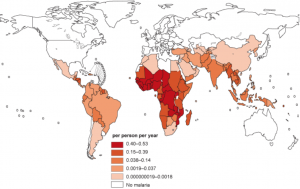QUESTION:
Can malaria affect the liver and stomach? I had two attacks of P. falciparum few years back. Now I doubt there is some swelling under my right rib bone. Please clear my doubt.
ANSWER:
Malaria can certainly affect many of the organs in the body, including the stomach and liver. This is due to the sequestration (attachment) of red blood cells to the tiny blood vessels in these organs, and is especially common in infections with P. falciparum. Given the large amount of blood that flows through the liver, this is a common organ to be affected by malaria, and can often seen to be swollen during the infection. However, it is unusual for the enlargement to persist after treatment, and so I would recommend you visit your doctor or hospital to check out any residual concerns you might have.
